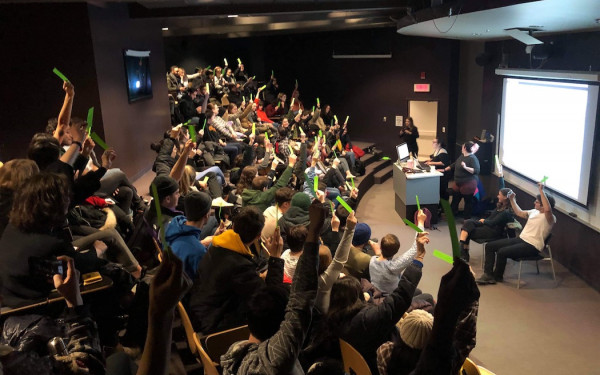Editorial: Concordia’s Sexual Violence Policy Lacks Clarity
Back in March 2015, a Concordia student—under the pseudonym of “Cathy”—filed a complaint under the Code of Rights and Responsibilities after her ex-boyfriend threatened her on campus.
The hearing for the case at the university level was postponed on multiple occasions, even after the perpetrator was charged in municipal court.
Cathy’s case was eventually solved in court, and was resolved at the university level in May 2016—over a year after the initial complaint was made. The hearing sentenced the ex-boyfriend to serve 30 hours of community service by the end of the 2016-2017 school year. Meanwhile, Cathy has not enrolled in any classes since the 2015 fall semester. This is just one high-profile example of the Code being inadequate in cases of gendered violence.
Concordia University has since implemented a new sexual assault policy, which came into effect in May 2016. Although this is a progressive step in the right direction, there’s a major problem. Right at the beginning of the nine-page document, a disclaimer states that:
“Nothing in this Policy shall replace or supersede any applicable University Policy or the provisions of any collective or employee agreement including but not limited to the Code of Rights and Responsibilities.”
What does that even mean? Why do the older policies in Code of Rights and Responsibilities take precedence over extremely important ones from an updated document that was drawn up specifically to tackle how we deal with sexual violence at Concordia? It’s a problem that, if any conflicts arise between the new policy and the old one, the old Code takes precedent.
Both the Code and the new policy have numerous problems. For one, the process is extremely long and drawn out, as evidenced by Cathy’s case. And because the new policy does not supersede the old Code, survivors are expected to undergo multiple processes simultaneously. Later in the document, it is said that the Sexual Assault Response Team will bring this case through the different institutional processes in order to prevent survivors from having to repeat their story multiple times.
We’ve already seen how the Code has failed Concordia students in the past. And if something doesn’t change, if we can’t find clarity—it will continue to fail survivors in the future.
When someone from the Concordia community reports an incident of sexual assault or harassment to the university, the policy states that the Sexual Assault Resource Centre will be the “primary resource for support and response.” This means that all responsibility of mediation and reconciliation is directed to the SARC.
The SARC is a crucial support service for students, whether they are just looking for someone to talk to or they need help dealing with the practicalities of the aftermath of sexual violence. As we’ve reported before, the SARC was, for a very long time, a one-woman show. Its coordinator, Jennifer Drummond, was the only full-time staff at the centre for the first three years of its existence.
While we believe that part of the SARC’s function as a student service—and as experts on the subject—should be to mediate, present solutions, and guide the process of an incident report, the fact that centre only has two staff—a service assistant was hired last fall—indicates that Concordia doesn’t take sexual assault seriously enough.
The new policy, despite its good intentions, relies very heavily on SARC—which translates, in practice, to relying heavily on one person. How can we expect one person to ensure that policy recommendations are carried out and that each case gets the attention and care it deserves, when that same person is also tasked with educating the community, supporting students on an individual basis, organizing events and generally managing the centre in its entirety?
So with an unclear code, an understaffed centre that is already doing as much as it can, and what seems to be a sheer lack of concern for the Concordia administration, how can a community member feel assured that their report, if they file one, will be taken seriously?
The circumstances can be extremely alienating for someone when on top of a lack of support and clarity from our immediate communities, we have many reasons to believe that police won’t even make the effort to ensure justice for survivors.
The government of Quebec is proceeding with a series of consultations on sexual violence on university campuses. The intention of these consultations is to, possibly, create a provincial law on the matter. We at The Link call on Concordia to take these consultations seriously, and consider how the results will affect survivors.
What we need to avoid is another complicated, inaccessible policy on sexual violence at our school—another addition to the imposing, byzantine maze of regulations that already exist. We need to streamline the process, and make existing rules accessible to survivors of sexual violence. Beyond that, Concordia should also be increasing the resources devoted to SARC.
If we’re going to finally begin taking sexual violence on campus seriously, then we need to center survivors in our discourse, policies, and practice.


_600_832_s.png)

_600_375_90_s_c1.jpg)


